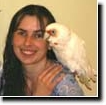The Benefits of Handling Your Birds Often
Kristen Reeves, Meadowlark Farms Avian Supply, Inc.
I know and understand that not everybody is a birdy Ninja like I am, and I also realize that not everyone is comfortable handling their birds. But I'd like to explain a few reasons why handling them is really imperative to a healthy flock!
But first, an explanation: I take liberties with my birds. I have never been one to "follow". When it comes to my birds, I always lead. I live outside the birdcage. My sole purpose in life while keeping birds is to disprove myths and prove theories. I ALWAYS question and never stop until I find the answer I'm looking for - and accept those answers even if they weren't what I was expecting! How will I ever know the answer unless I take some risks and just TRY??? The answer to that question is I'll never know UNLESS I try. Therefore, I just do whatever I need to do to get that answer. You can't always worry about what another breeder will say.
Sometimes you just have to live outside the birdcage and do it! Take that risk! Just call me the "Robert Stroud" of the Gouldian world!
I've heard all the horror stories –
- "Don't touch the chicks, the parents will abandon."
- "Don't stick your hand in the cage unless absolutely necessary, it is too stressful for the birds."
- "Don't chase the birds with a net. 5 minutes of quick chase then some rest time is better than 10 minutes of chasing."
- "Don't touch the eggs, the oils in your hand will clog the pores of the egg shell and can cause the chick to die in the shell."
I say BAH to all of that! It's bunk. I've tested each and every one of these "myths" and have found them all to be untrue. I touch chicks, eggs, and parents multiple times throughout the day and they don't abandon. I always wash my hands before handling eggs because oiling WILL cause clogging of the pores on the eggs, but if your hands are relatively clean, there is no reason not to handle them if you need to. I chase my birds all over the place - usually all over the bird room. It's how I get my exercise! And when "I" get tired of chasing "them", I just stand still and wait for them to come to me - then I just snatch them out of the air with my bare hands. Learn how your birds move and you'll never have to fight to catch them again! Be one with the bird! Seriously gang. We need to lighten up!
Sure, if you have wild-caught birds that have rarely been in the hands of a human, chances are they will indeed stress out a bit. BUT, these little guys are MUCH stronger than most breeders give them credit for! You must get them used to you. The easiest way to do that is to get them from a chick and handle them often into adulthood. But if the birds are from another breeder and have never been handled, you need to be able to work with them in case of emergency!!! Take them in hand!
Handling your birds often will give you a good idea of their overall health-
One of the reasons I prefer Scatt over an in-the-water Ivermectin treatment (though I DO use both) is because it forces me to handle the birds regularly. Sure, I have a lot of birds and it can take me hours or even days to get through them all. But when I'm done, I have an excellent idea of not only who is healthy, but who may be coming down with something, who may be too fat, who may be too thin, who is beginning an early molt or even who is coming into condition when it wasn't expected. I know every feather, every eyelash, every weight of every bird in my aviary. I know instantly when taking them in hand whether or not they've gained or lost weight. I know if there are feathers missing, and/or if something just isn't right - merely because I handle them so often and know each and every one of them so well.
Handling them enables me to catch issues early. When I take a bird in hand for ANY reason, I always check them out from head to toe. I check eyes, nostrils, chest, belly, vent. I blow the feathers away from the belly and from up around the crop. I pull each wing out and check feathers and look for signs of mites. I weigh the bird and apply Scatt if they are due.
I trim nails and beaks if necessary, and always kiss the top of their tiny birdy heads before releasing them back into their cage or flight - because if they "smell" like anything, this is when I will most likely notice! They should NOT smell like ANYTHING!
I make notes about each bird, recording anything I see that has changed from the last time I handled them. Yep, it's a lot of work, but it is well worth it in the end.
Handling them often also makes them less afraid of you for the times you MUST handle them.
If you have an emergency in the bird room - a bird gets a leg caught in the cage bars, has a broken wing, had night frights and is injured, is egg bound, is bleeding, or any other issue that could possibly occur - you don't want the bird to drop dead in your hand just because you caught them! You need them to remain calm enough that you can handle them and attend to their injuries or needs.
When you handle them often, they will be less stressed when you NEED to handle them.
Now here, my birds are in a constant state of change. I move cages regularly - sometimes daily (yes, even during breeding season) - I walk through the bird room slowly, but with purpose. I don't whisper, I don't tip toe, I don't walk on egg shells. I act perfectly normal. I'll often have music playing quite loudly because I like to head-bang to a little AC/DC while I'm cleaning cages (this is truth!). I run the shop vac daily, and sweep up under the cages several times per day. I reach into every single cage at LEAST once per day, but more often than not, several times per day. I'm wiping, chasing, checking nest boxes and/or chicks. I'm checking breeding adults for signs of lowered immune. I'm in there almost constantly throughout the day - all while multi-tasking on some other project or job.
When I bump up chicks with hand-feeding formula, I just reach into the cage and pull out the nest. If the parents are still in the nest, I open the lid and lift them off the chicks, then shoo them into the cage. It's like talking to someone without mincing words. You're telling it like it is. When I go into the bird room, I don't let the birds dictate to ME how I'll act, I dictate to THEM how THEY should act.
Mine are so tame many will come up to the cage bars and often kiss me. They sit close to me on a perch and sing their little hearts out. If I whistle their song to them, they whistle back. They hiss at me and even try to bite when I try to remove them from their eggs or chicks for the umpteenth time of the day, but they rarely ever freak out. Yes, they give me the "birdy evil eye", but they know I'm there to help. They know I'm there to take care of them, and they know when they need something all they need to do is ask. Yes, they "tell" me when they need something.
If you pay attention to their body language, you'll see they may well be telling YOU something too!
If you are afraid, they will sense that. If you are clumsy handling them, they will respond in kind - but the more you practice, the less clumsy and more confident you'll become - and the less skittish your birds will become. Handling them takes practice, but practice makes perfect! It's really not that difficult if you only try. The more you do it, the easier it becomes!
SIDE NOTE: One of the things I will always remember because I was actually angered by it, was when someone posted a comment on one of my videos. They'd said that it was a shame I had used a dead bird to show how I do something. I was mortified! I sat and stared at that video long and hard to see if the bird ever moved - thankfully, it did SEVERAL times and was proof the bird was not dead, only very calm and quite comfortable in my hand. It never occurred to me that someone would think I'd use a dead bird in one of my educational videos. I was appalled they'd even suggest such a thing and told them as much! They were obviously one of those who never handles their birds and the birds freak out when they approach the cage. Mine just don't do that. That video was testament to how calm they really are.
Obviously you won't always get every bird to be that laid back and calm, but you can really get the bulk of your flock calm and settled with just a bit of attention daily.
Be one with the bird! Handle them often. Get to know them, and they'll get to know YOU!





